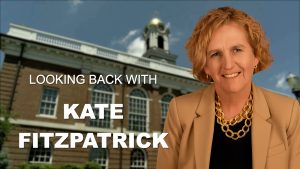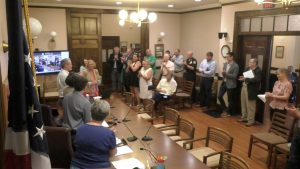April 6, 2023
• An overview of the recommendations to improve access to housing in Needham.
reported by Yuxiao Yuan
Recently, the town adopted an action plan striving to become an MBTA community by rezoning for multi-family development near its four commuter rail stations. Town planners consider this a critical step in addressing Needham’s own housing crisis. However, it’s only one aspect of the town’s Housing Plan, which had not been updated since 2007. Let’s take a closer look at some of the other recommendations in this plan, and the challenges to implementing them:
Rezoning for multi-family housing development presents a significant opportunity to increase the housing stock and to diversify the types of housing available in Needham.
Natasha Espada, Planning Board Member: Everyone will benefit from it, because it will allow, not only the people that live in Needham to have different opportunities as they age or starting out as families, but also the people that work in Needham: our teachers, others, people that work in our community, and are invested in our community, and don’t have opportunities to live in our community at this moment.
Another measure that could have an immediate effect is to relax the requirements for accessory dwelling units or ADUs. In 2019, Town Meeting approved the creation of attached ADUs with occupancy limited to a family member or a caregiver.
Cindy Macgowan, Needham resident: We really wanted the space to seem contiguous to our own home, so we did the pocket doors and built her a lovely apartment that really has all the amenities that she would need.
Cindy Macgowan’s mom moved into the unit after selling her own property in Connecticut. Despite the restrictions on occupancy, the passage of ADU laws three years ago provided opportunities for senior and disabled residents to stay in the community.
Cindy Macgowan: She’s thriving here so that was the whole idea, is to bring her closer to family and allow her to thrive as she gets older, and we will be here to help her along the way.”
To help more groups with their cost of living, the Needham Planning Board is proposing to amend ADU bylaws, so they can be rented out for extra income. The amendment will be voted on at the annual Town Meeting in May. With a proposed maximum size of 900 square feet, those units provide an ideal option for people seeking one bedroom apartments with a suburban feel, which town planners see as a win-win policy for both property owners and the renters.
Jeanne McKnight, Planning Board Vice Chair: …For example, young adults just getting a start in life whose incomes might not be high enough to be able to afford a larger unit without having roommates and so forth, and also seniors themselves. It is possible for the owner of the property to live in the accessory dwelling unit and rent out the the larger part of the house and gain considerable income.
The proposed changes would also permit detached ADUs, either by converting an existing detached accessory structure such as a garage or a barn, or by creating new construction. However, Special Permits would be required to ensure that the Single Family appearance of the neighborhood is maintained.
Another proposed policy specifically targets lower and moderate income populations.
The adoption of town-wide inclusionary zoning, would require projects with at least six units to provide 12.5% affordable units for households earning at-or-below 80% of the area’s median income.
Jeanne McKnight: We should have, in all of our zones where we allow multi-family housing, we should have an affordability requirement.
Natasha Espada: We don’t want it to be project-by-project, we want there to be a goal.
However, this policy has an even higher affordable unit requirement than the MBTA Multi-Family Communities Act, which set a 10% affordable housing limit within the designated zoning areas. Municipalities will need to go through additional procedures to implement it.
Jeanne McKnight: You have to file an application with the Department of Housing and Community Development and show how developments in your community would still be feasible at a higher percentage, and we have used 12.5% and we think we can show that 12 and a half percent is feasible.
Town officials have also recognized that the Affordable Housing Trust Fund is being underutilized. Currently, it is mainly used for an annual Small Repair Grant Program totaling $50,000.
Jeanne McKnight: Many communities have their affordable housing trust doing a
lot more than our affordable housing trust does.
The League of Women Voters is studying better ways to operate a fund with a report expected in June.
Natasha Espada: What opportunities are there for that to be funded? Who should compose of that board that has expertise that can help the board make decisions moving forward, and can look at it holistically? And we are hoping that the Affordable Housing Trust can hold some of the accountability for the targeted housing goals that we’re looking at, and identifying impacts of housing proposals.
If the town adopts the inclusionary rezoning, a development that is unable to provide affordable housing because of its scale can contribute to the trust fund for the town to allocate to other affordable housing projects.
Jeanne McKnight: You don’t expect a developer of three units to make one of them affordable. That would make the whole development unaffordable. But a proportionate fee that you pay into a fund and then that money could go to the Affordable Housing Trust.
Other strategies under consideration include adopting laws that incentivize energy efficient developments, such as allowing as-of-right zoning for solar installations. The housing plan also offers potential solutions for reducing teardown activities,
a major driving force behind rising housing prices.
• An overview of the recommendations to improve access to housing in Needham.





More Stories
ZBA Deliberates Tight Fit on Chestnut Street
Envision Needham Finds Resistance
Needham Open Studios Turns 25